Abstract
The article deals with educational practices of the University in the field of lifelong learning on the example of mastering foreign languages. The issue of the improvement of professional training of specialists is revealed along with the necessity of the formation of design and professional skills in the training of engineering personnel, including those in the field of teaching foreign languages. The authors rely on the project approach emphasizing that the electronic training environment is a necessary condition for obtaining hybrid competencies today, allows people to integrate into modern society, become more successful and competitive. Three projects of Tomsk State University of Control Systems and Radioelectronics are discussed in detail: Virtual Classroom in collaboration with Tomsk Physical and Technical Lyceum; Master’s training within the chain “School-University-Enterprise”; Project “English for Active Third Agers” in collaboration with Moscow Polytechnic University. Presented scientific and practical developments in foreign language learning within the concept of lifelong learning via information technologies improve the education quality and address the innovative challenges of integrating practical and vocational components in the context of lifelong learning. For the first time, the experience of the interdisciplinary integration of educational resources and programmes in the Russian Federation is presented in the case of TUSUR and Moscow Polytech. The integrative activities are motivated by the need to build a purposeful educational strategy within lifelong learning. The results make a significant contribution to research on the application of education to the needs of the economy and society.
Keywords: Adultse-courseeducational environmentlifelong learningstudents
Introduction
The complexity of modern facilities and communications has increased to such a level that there is a need for trainees to continuously update their competencies. In this regard, there is a need for hybrid specialists to solve complex problems. The use of distance learning and various online services give access to educational resources almost to everyone.
The problems of e-learning in a foreign language and the need to use integrated approaches to learning a foreign language are reflected in the works by Vasiu and Andone (2014), Baker and Watson (2013), Pinto et al. (2016) and Talmage et al. (2015). Researches by Wang et al. (2018) and Salinas et al. (2012) and others focused on the development of the competencies of all participants in the educational process, teachers and students as a condition for the quality of the educational process (Costello, 2014; Gavin, 2013).
Problem Statement
The currently widespread practice-oriented approach is revealed in the work by Rault (2016) Language course and vocational teaching scheme in a Masters’ degree of applied foreign languages: a project approach in advanced students' training. However, the educational trend set by globalization to improve professional training of specialists focuses not only on practice-oriented technologies, but also necessitates the formation of design and professional skills in the training of engineering personnel, including those in the field of teaching foreign languages.
Research Questions
The study of distinct researches in the sphere of integrated approaches to e-learning a foreign language has set a number of questions, i.e. the analysis of the application potentiality of lifelong learning technologies at higher education institutions for completing both academic objectives and aims of developing a special environment for cooperation with municipal community.
Purpose of the Study
The research is aimed at justification for the approach according to which the University is seen as an accelerator of lifelong learning practices through the use of project technologies in a foreign language, the implementation of e-learning courses and the enlargement of their functionality for various target groups.
Research Methods
The leading role in building a high-quality e-learning environment belongs to universities that integrate many consumers of educational services, forming models of interaction between subjects of socio-economic relations, including the practice of lifelong learning (table
The implementation of the educational paradigm of lifelong learning in this model is rationalized for several reasons:
the State actualizes the need for creative activity of a specialist, his critical thinking, which is reflected in various programs of pre-University (school) training of future personnel;
employers' orders for graduates to possess real competencies demanded by business are carried out through a system of advanced training technologies, among which the most productive is professional project training of students, focusing on the student's personality, interests, orientation and internal activity;
the customer, choosing a particular direction of training at a University, focuses on the effectiveness of training each individual person, trying to find an acceptable approach and a suitable program to master certain competencies (Mironuk, 2020).
As an example, let's take a closer look at the most significant and popular TUSUR projects aimed at implementing the educational paradigm of lifelong learning.
The research is based on the systematic approach, using survey methods, methods of mathematical data processing and modeling. The models are author's e-learning courses, which are created using the tools of pedagogical design: analysis, designing, development, implementation, and assessment.
The analysis identified student needs, target audience, objectives, courses and teachers, forms of work with the audience and a list of expected results. The conclusions of the analysis make it possible to develop a plan and structure of e-learning courses, to begin designing the exercise scheme and evaluation system, the visual series and the course interface. During the design process, a course prototype is created that determines the impact of each course element on the tasks that were identified in the first stage. At the development stage, the necessary exercises are selected, a feedback form, and a methodology for checking the development of the material passed are developed. In the course of implementation, the compliance of a certain course in general for the selected audience is evaluated, and the first data about its completion and effectiveness are obtained. The authors compared the tasks identified in the analysis with the results obtained in practice.
Findings
Tomsk State University of Control Systems and Radioelectronics (TUSUR) Language school (Pokrovskaya & Tavanova, 2019), implemented within the framework of the strategic partnership of the University with Tomsk Physical and Technical Lyceum (TFTL), offers the use of the "virtual classroom" (VC) technology for the implementation of professional project training of schoolchildren using English.
Virtual Classroom
Similar to face-to-face language classes, the teacher and students enter a virtual classroom and work together on the lesson material (synchronous learning), namely, communicate via audio and video communication, share texts and presentations on an interactive whiteboard, etc. All teaching materials from the teacher are displayed in the student's electronic notebook. The VC provides for the possibility of including a demonstration of the teacher's desktop for a better opportunity for students to repeat the actions of the teacher.
The undoubted advantages of VC are:
access to recording sessions offline;
conducting classes from any location;
interactive tools that help students focus their attention and stimulate the perception process.
Digital opportunities today allow you to save time, practice your own written and spoken English online, following your own rhythm of classes and developing autonomy in the learning process.
Master’s training within the chain "School-University-Enterprise"
In addition, within the continuous chain "School-University-Enterprise", targeted master's training is a popular area of the educational system. Leading technical universities in Russia and the world have a certain positive experience of interaction "University-Employer" in this area.
The e-learning course “EdConForLang” (Educational Course on Foreign Language) has been developed for the discipline “Foreign Language” for Master’s degree on dual university platforms (TUSUR University Online Learning Platform) based on LMS Moodle which responses to the requirements of a future employer – this is reflected in the methodological content of the course. The implementation of the e-course was conducted due to the support of Vladimir Potanin Foundation in 2007.
Thus, TUSUR, acting as a leader in the field of creating and mastering the methodology of project training and professional training of engineers, implements a system of innovative foreign-language training of specialists, which ensures the generation of a new wave of scientific and industrial elite of the country. On the basis of TUSUR, master's programs have been formed, in which a significant part of the subjects of the variable part is offered by the employer, and some of them are taught by invited specialists of the enterprise – the industrial partner of the University.
Master’s students language training serves as a local integrator in the field of professional interaction with employers (Pokrovskaya et al., 2018) in order to improve the quality of the educational process by focusing on the development of the competencies of all participants in the educational process: teachers, master’s students, as well as systematic work on interaction with employers. This connection, according to TUSUR's experience, is carried out by inviting specialists of enterprises to teach certain disciplines. Turning into industrial partners of the University, employers identify the formation of design and professional skills as the most popular competencies for master’s students (according to the results of expert interviews).
Following are examples of e-learning course components (figures
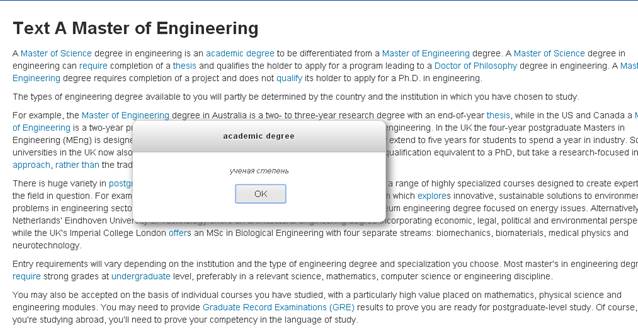
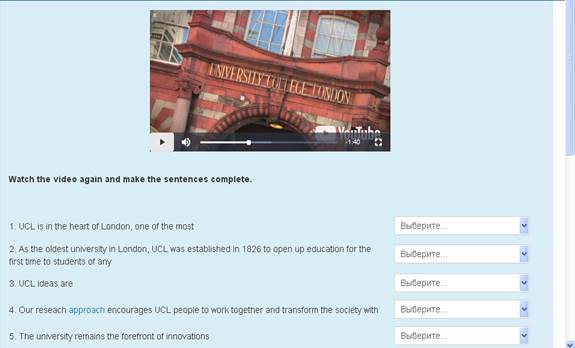
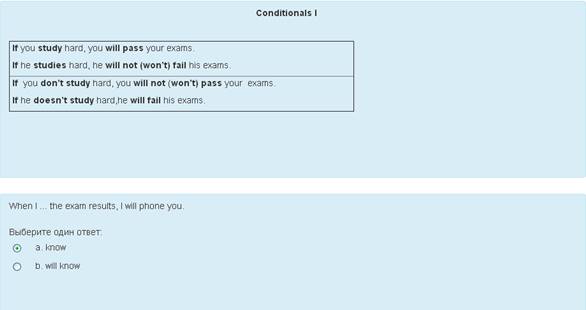
Project “English for Active Third Agers” within the scope of Tomsk and Moscow
Another significant project (“English for Active Third Agers”) is the one aimed at the activity of third-age citizens as the basis of the policy in the field of ageing (ageing policy) at international level; it is implemented in diverse forms of manifestations characterized by a wide range and variability (leisure, travel, training, etc.).
The aim of the project is:
to develop “active third ager” model through foreign language e-course based on European research ideas of autonomous and active ageing.
The objectives are:
to develop guidelines and frameworks for third agers (adult students), veterans’ council, who want to encourage European mobility and travel;
to develop a platform for cooperation between adult students’ veterans’ council, who want to encourage European mobility and travel;
to provide formal recognition of mobility activities by defining learning outcomes achieved by means of travelling and social networks chatting experience of adult students;
to further spread the practices of adult students’ education in local communities.
This project addresses to priority of open education and life-long learning. Universities need to be able to engage more with their local communities and this is precisely what this project will work on. There is a great untapped potential “out there” which is rarely used: in many cities there are plenty of adult students who are more than willing to engage in local educational, cultural projects and get closer to the community in which they live. The students’ engagement has lots of valuable experiences and knowledge which they are more than willing to share. The project thus addresses the priority area for change identified in the public consultation on the city modernisation agenda: “breaking down the barriers between higher education and the ‘outside world’ in local communities”.
The project concept builds on an existing project, which is highly successful and with proven results; it involves key stakeholders with an operational capacity to carry out the proposed activities and a genuine interest in the topic, plus and a proven experience in delivering results; and the approach is evidence-based, starting with small-scale testing and then building on the best-practices that have proven to work.
It promotes the importance of life-long learning, popularizes foreign language learning, and improves the quality of life for third agers. The purpose of the project is to develop a system of foreign language popularization as a means of communication for third agers using an e-learning course in the Foreign Languages Department of Tomsk State University of Control Systems and Radioelectronics (TUSUR) - http://sdo.tusur.ru (TUSUR University Online Learning Platform, 2019). The tasks are as follows:
to identify the target audience, to specify groups and levels of language competency;
to develop the content of educational programmes;
to define the main points of growth in individual trajectories of students;
to review the approbation results;
to come up with recommendations on the application of the e-learning course.
Based on the above-mentioned tasks, we note that the project is designed for people with different levels of language competency. An e-learning course allows relatively easy individualization of training trajectories since it incorporates various grammar, listening, reading, and writing tests, as well as different interactive tasks. When developing our course, we employed the most important principles of using emerging technologies in education, in particular, for the development of online courses, including: the principle of scientific character (optimization of the process of teaching materials selection), the principle of activity (opportunity to demonstrate intellectual activity), the principle of consciousness (selection of teaching materials), the principle of visualization (use of auditive and audiovisual components to develop skills of foreign-language speech comprehension); the principle of availability (organization of the educational process depending on the level of communicative competence development), the principle of systematicity and sequencing (structurally functional coherence of presentation of content).
The long-term effects of using the e-learning course are medical and improving, cultural and educational, social and economic.
Content of the course is connected to the European integration processes and it supports the main element of the “active third ager” model – person’s self-realization as a highest value.
Some final words should be mentioned about the fact that a lot of the factors affecting the project’s success have been secured already now, even before the application deadline. Thus, we have started a course on veterans’ mobility with City Department of Social Policy. This makes the project concept even more credible.
Two groups of students (persons of third age) were formed: one engaged in the use of the e-course as homework, the other independently studied the topics in the e-course and received face-to-face consultations. Both groups noted the effectiveness of this type of training (self-monitoring, task performance at any convenient time).
It is obvious that the project can be ‘replicated’ to the cities where the project participants work (Moscow, Moscow Polytechnic University).
At the present time, the Moscow longevity program is being actively applied in Moscow intended for the third age people (Moscow longevity program, 2018). The primary purpose of the project is providing social activity of pensioners via the organization of intellectual, sports, and creative activities. Moscow Polytechnic University has been engaged in the “Moscow longevity” since March 2019 offering older Muscovites courses in computer literacy, economy, business skills, foreign languages.
Moscow Polytechnic University renders two courses of the English language – elementary and pre-intermediate – aimed at ensuring memory training, raising cultural awareness, and preparing learners for travelling abroad (Moscow longevity program at Moscow Polytechnic University, 2019). The content is represented by various general topics, i.e. Travelling, Hobbies, Work, Culture, etc.
As a part of the experiment, along with offline classes, the “Moscow longevity” participants were offered to enrol in the e-learning course “English for Active Third Agers” in the TUSUR Foreign Languages Department (TUSUR University Online Learning Platform, 2019).
The results of the experiment are presented in Figures
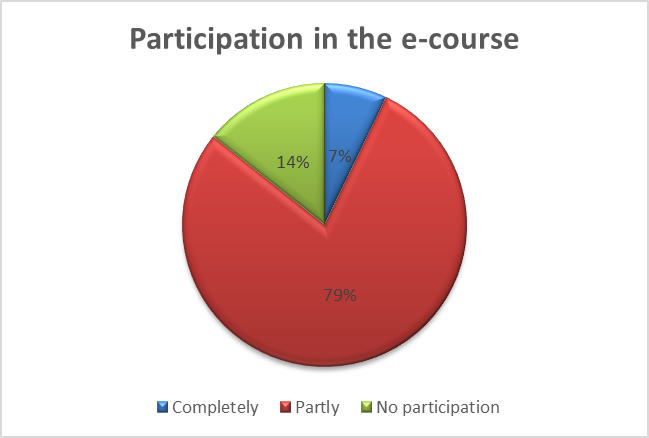
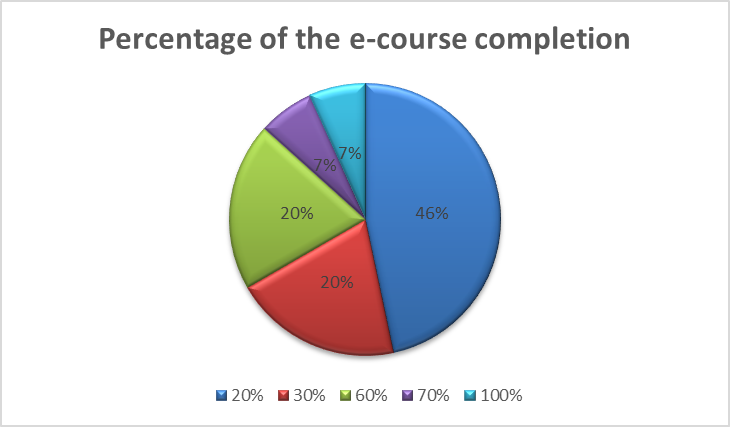
The outcome of the experiment in Moscow Polytechnic University indicates that the majority of the learners, who had been studying simultaneously offline and online, demonstrates the active inclusion in both modes of learning. According to the survey conducted among those attendees, the integration of the “Moscow longevity” classes and the TUSUR e-learning course contributes to gaining stronger linguistic knowledge, building the feeling of success and confidence, developing learning autonomy. The results prove the integration of third agers into modern society and improvement of their psycho-emotional state.
The English for Active Third Agers project (application №C3M 180000285) is supported by Vladimir Potanin Foundation and is the winner of the competition of socially important initiatives in 2018 in the Professional Realization nomination.
Conclusion
In conclusion, we note that in an information society defined by the activity of innovative search in all spheres of life, requests for a higher quality of life, etc., the key factor in the success of universities and the competitiveness of the State are new knowledge and technologies that need to be acquired throughout life in order to be included in the global world and provide an adequate response to the challenges of modernity.
References
- Baker, W., & Watson, J. (2013). Mastering the online master’s: Developing and delivering an online MA in English language teaching through a dialogic-based framework. Innovations in Education and Teaching International, 51, 483-496. https://doi.org/10.1080/14703297.2013.796712
- Costello, E. (2014). Opening up to open source: looking at how Moodle was adopted in higher education. Open Learning, 28, 187-200. https://doi.org/10.1080/02680513.2013.856289
- Gavin, W. P. (2013). Free choice of learning management systems: do student habits override inherent system quality? Interact. Tech Smart Ed, 10, 84-94. https://doi.org/10.1108/ITSE-07-2012-0019
- Mironuk, S. (2020). Lifelong education. https://www.rbc.ru/trends/education/5db052339a79474bb99691c5
- Moscow longevity program (2018). https://www.mos.ru/city/projects/dolgoletie
- Moscow longevity program at Moscow Polytechnic University (2019). https://old.mospolytech.ru/index.php?id=6307
- Pinto, S., Araujo, & Sa, M. H. (2016). Language learning in higher education: Portuguese student voices. International Journal of Multilingualism, 13, 367-382. https://doi.org/10.1080/14790718.2015.1102917
- Pokrovskaya, E. M., Lychkovskaya, L. Y., & Smirnova, O. A. (2018). The activation model of university – employer interaction in the field of master’s students’ foreign language proficiency. Linguistic and Cultural Studies: Traditions and Innovations, 677, 187-194. https://doi.org/10.21293/1818-0442-2017-20-3-238-241
- Pokrovskaya, E., & Tavanova, E. (2019). Yazykovaya shkola TUSUR – instrument nepreryvnoi podgotovki „shkola-vuz-predpriyatie“ [The TUSUR language school as an instrument of continuous training „School-University-Enterprise“]. Modern education: education quality and up-to-date problems of a modern higher school, 1, 305-306. [in Rus].
- Rault, D. (2016). Enseignement de langue et formation professionnalisante au sein d’un master LEA: Une demarche de project dans la formation d’etudiants avances [Language course and vocational teaching scheme in a masters degree of applied foreign languages: A project approach in advanced students’ training]. Recherche Et Pratiques Pedagogiques En Langues De Specialite - Cahiers De L’APLIUT, 35, 1-9. https://doi.org/10.4000/apliut.5381 [in Fr]
- Salinas, J. G., Cabrera, A. F., & Rios, S. M. (2012). Autonomia en el aprendizaje de lenguas extranjeras en contextos de ensenanza mediatizados por la tecnologia [Autonomy in foreign language learning in technology – mediated contexts]. Onomazaein, 25, 15-59. [in Sp]
- Talmage, C. A., Lacher, R. G., & Pstross, M. (2015). Captivating lifelong learners in the third age: lessons learned from a University-based Institute. Adult Education Quarterly, 65, 232-249. https://doi.org/10.1177/0741713615577109
- TUSUR University Online Learning Platform (2019). http://sdo.tusur.ru
- Vasiu, R., & Andone, D. (2014). OERs and MOOCs – the Romanian experience. International conference on Web and Open Access to Learning, 1, 1-5. https://doi.org/10.1109/ICWOAL.2014.7009243
- Wang, S., Gorbunova, N. V., Masalimova, A. R., Birova, J., & Sergeeva, M. G. (2018). Formation of academic mobility of future foreign language teachers by means of media education technologies. Eurasia Journal of Mathematics, Science and Technology Education, 14, 959-976. https://doi.org/10.12973/ejmste/81150
Copyright information

This work is licensed under a Creative Commons Attribution-NonCommercial-NoDerivatives 4.0 International License.
About this article
Publication Date
18 December 2020
Article Doi
eBook ISBN
978-1-80296-097-6
Publisher
European Publisher
Volume
98
Print ISBN (optional)
-
Edition Number
1st Edition
Pages
1-788
Subjects
Communication, education, educational equipment, educational technology, computer-aided learning (CAL), Study skills, learning skills, ICT
Cite this article as:
Pokrovskaya, E. M., Lychkovskaya, L. E., & Molodtsova, V. A. (2020). The University As An Accelerator Of Lifelong Learning Practices (Based On ELT). In O. D. Shipunova, & D. S. Bylieva (Eds.), Professional Culture of the Specialist of the Future & Communicative Strategies of Information Society, vol 98. European Proceedings of Social and Behavioural Sciences (pp. 443-452). European Publisher. https://doi.org/10.15405/epsbs.2020.12.03.44

